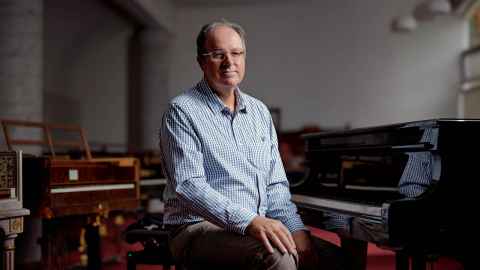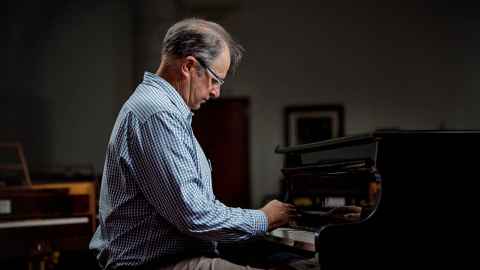David Lines: travelling together
1 July 2025
When David Lines’ great-grandmother travelled from Scotland to New Zealand, her piano came too. Today, the professor continues to walk in her footsteps.

There are those who move fast, and those who move together.
Newly minted Professor of Music David Lines will tell you himself that his path to professorship took longer than most.
The self-described ‘good boy’ was so immersed in mobilising peers and students and fostering collaborations across the University that he almost neglected the one person he needed to push into the limelight – himself.
“I care about research, but I really get my kick from working with people … doing creative and interesting things.
“I suppose it’s the boring word service,” he says. “And I really like making things happen.”
David realised early on that steering projects to completion was just one of many strings to his bow; his real superpower lay in mobilising and galvanising people.
“It’s got to be a collective thing, helping people. People have all these different talents and skills, and so much to offer. It’s kind of silly if it’s just one person’s empire.”
Dean of Arts and Education Professor Nuala Gregory describes the highly accomplished musician as a quiet and selfless leader, ahead of his times. She says David is a great example of the virtuous circle of research-teaching-service; each aspect interacting with the others to generate a more profound impact.
“He has been thinking and acting in interdisciplinary ways since long before those concepts were formalised and disseminated across the University,” says Nuala.
His recent work includes contributions on improvisation pedagogy, arts-based research, community arts, and music education.
David marked his promotion with an inaugural lecture, ‘Musical Dialogues’, in May, featuring musical interludes on a grand piano and collaborations with students and musician friends.
While our lives contain thousands of interactions and conversations, what, he asked, does quality dialogue look like? Because as social beings, the nature of our connections impacts the quality of our communication.
“I would also add it contributes to a rich and creative life,” says David, “and for a good education too.”
I care about research, but I really get my kick from working with people … doing
creative and interesting things.
The good boy
Family members in the audience included wife Rebecca and his first piano teacher, 93-year-old mother Alison Lines.
The youngest of four, David grew up on an apple orchard in the Horowhenua. Displaying exceptional musical talent as a child, he travelled two hours to Wellington weekly, studying under a classical piano teacher, with lessons continuing through to university.
Learning under the ‘master teacher and student’ model demanded adherence to a strict hierarchy. Studious and dutiful, David came to embody the archetype of the ‘good boy’, faithfully following the lead of his teacher, trained in Europe, performing the great classical works with the precision and reverence intended by their original composers.
But the rise of popular music sparked a new musical interest once David became a teenager, and likely was the nudge that changed not only the trajectory of his life but broadened his outlook. An older brother played guitar, so 12-year-old David approached his parents to do the same.
“I said I want a guitar – and they argued with me for a little bit. And then they said ‘okay!’”

Learning guitar by ear compared with the highly structured and disciplined nature of classical piano training was a gamechanger, but it would be years before David would fully appreciate the contrasting experiences.
“It wasn’t like piano,” he says. “You played around, listened to tunes, and copied them ... that was the first thing that broke the cycle.
“I think about it now as a mature adult, and I call it closeness – being really close to the music – and it was so embodied. Like, ‘what is the sound?’”
“So, there’s something about that in pedagogy, in being close to what you are doing.”
The experience inspired the chapter ‘A Piano mismatch – Passion, dreams, and being a “good boy”’ published in the Routledge Companion to Music, Autoethnography, and Reflexivity (edited by Gouzouasis and Wiley) last year.
Inspiring a generation
David completed his music degree at Victoria University of Wellington before heading north to the University of Auckland, where he studied arts and science.
“I’d always been interested in not just one thing,” he says of his foray into subjects spanning geology, mathematics, psychology, sociology, anthropology, education and philosophy.
“I think I just love learning things … for me the buzz is crossing the boundaries.”
It’s that same buzz that’s seen him tirelessly call everyone to action. Once he’d entered the teaching field, David saw an opportunity to produce musicals, and give young people the opportunity to co-create them. Students from Henderson’s Bruce McLaren Intermediate (most now aged in their 30s) not only performed in David’s first school musical – Maurice Gee’s The Halfmen of O – but likely got their first big break composing music, collaborating with David.
“It’s hard to explain the feeling and collective experience of creative camaraderie, but it was something special.
“Later on, as a university lecturer, I had students come up to me and say ‘Are you David Lines from intermediate school? I was in your musical’ and it was just fantastic. It’s a very special moment when a teacher feels just a little bit famous,” he laughs.
I just love learning things … for me the buzz is crossing the boundaries.
A familiar path
The boy from Horowhenua who became an accomplished pianist and a ‘famous’ teacher unwittingly followed in the footsteps of his great-grandmother. A gifted musician and music teacher, Annie Pollock came to New Zealand in 1898, invited by David’s great-grandfather, David Todd; the two had grown up together in Glasgow, Scotland.
“It’s interesting because it’s like a parallel of my career, this great-grandmother I’ve been reading about. She’s got all these teaching notes and musical notes of what she was doing,” says David.
She was intent on bringing her piano, and David also came across letters containing advice to fill the instrument with blankets for the long trip. Annie arrived and married, moved to their Gisborne farm, and had two children – only to die 18 months later.
“When my grandfather was 18 months old, Annie was found at the bottom of a cliff. We don’t really know what happened, but it wouldn’t have been easy back then.
“There’s a story in our family that Annie’s piano journey to New Zealand from Scotland and her tragic death had some connection with other musical stories.”
He says it might have been part of the genesis for Jane Campion’s award-winning film The Piano, despite the stark differences of how Campion devised her main character.
“Annie was very accomplished, very much her own woman and empowered,” says David. He honoured his great-grandmother at the lecture, proudly showing pictures of her music certificates and meticulous lesson plans.
Breaking down barriers
David’s latest adventure, the Creative Pedagogies Network, seeks to connect academic staff and explore creative pedagogy. It is a collaboration with dance studies colleague Professor Alys Longley and funded by the University’s Teaching and Learning Grant.
“Sometimes the University is tribal, or hierarchical. I’m keen to break down those barriers, which is what that the creative pedagogy project is all about,” he says.
“It’s about crossing disciplines, and talking to each other and sharing. It’s asking ‘what do you actually do? What drives you? What gives you passion?’ And exploring anything that comes from that.”
Kim Meredith
This article first appeared in the July 2025 issue of UniNews.